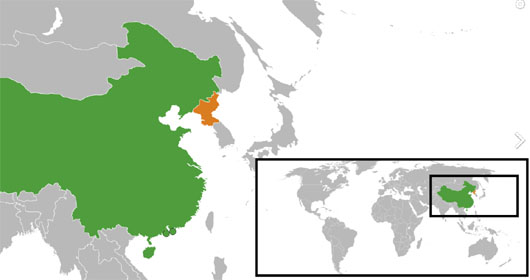Special to WorldTribune.com
North Korea’s Marxist “Monarchy” could be at a critical crossroads as recurring rumors about the death or incapacitation of the Supreme Leader Kim Jong-Un swirl around the nervous Korean peninsula.
Despite a wildfire of media speculation, pending the definitive outcome of Kim’s health, the hard reality remains that the self-isolated “hermit Kingdom” may be on the cusp of serious political change.
This is not necessarily good news either for neighboring South Korea, or for the United States who is militarily bound to defend the democratic South.

The quaintly titled Democratic People’s Republic of Korea (DPRK) or North Korea is hardly even a typical communist regime. Founded by Kim Il-Sung (under Stalin’s personal guidance) in 1948, the regime is now on the third generation of Kim Family rule; grandfather Kim died in 1994, his son, Dear Leader Kim Jong-Il, passed in 2011 and, the grandson Kim Jong-Un (36) now controls what is clearly the world’s first Marxist Monarchy.
The Kim family rule is based on a strange blend of Marxism/Leninism, hybrid Confucianism, and Korean Shamanism. The regime rules like a political cult which mirrors Mao’s China during the so-called “Cultural Revolution.” The family blood line [considered sacred by the North Korean hierarchy] goes to births on the legendary Mount Paekdu, a kind of Korean Mt. Olympus shrouded in double Rainbows.
Just weeks ago, on April 15, the annual commemorations for Kim Il-Sung’s birthday, the most sacrosanct holiday for the regime went ahead without the dutiful presence of grandson Kim Jong-Un. Blame it on Coronavirus which does not “officially” exist in the North but which could be a virulent and silent killer even in a communist land which bans reality.
Then came the 25 April Army Day commemorations where the young dictator Kim (who never spent a day even in the Boy Scouts) would play Generalissimo and Leader of the huge DPRK military. No General Kim Jong-Un. The rumor mills especially in Japan went into overdrive and American Twitter sites went apoplectic; South Korea said little as they have seen this movie before and are pretty sanguine about rumors. Caution!
But whatever is going on in the mists north of the 38th parallel could be the long-awaited game changer.
Remember Kim Jong-Un has during a particularity dangerous “March Madness” showdown in 2013, threatened to use his nukes and ballistic missiles on Japan and the USA!
In 2017, Kim tried the same intimidation tactic with the new Trump Administration. Kim threatened East Asia and the USA with nuclear attack. President Trump pushed back; Kim blinked.
When war looked inevitable to some, not surprisingly Donald Trump took the diplomatic path and soon there was the Singapore Summit which thankfully stopped the ticking nuclear clock but did not solve the problem of Pyongyang’s nuclear proliferation.
So who’s in line to lead the world’s Marxist Monarchy?
Kim’s Jong-Un’s younger Sister Yo-Jong (31) has been quietly groomed during the past two years. She played a star propaganda role leading a North Korean delegation and cheerleading contingent to the 2018 Winter Olympics in South Korea and soon became a Pyongyang’s budding star for South Korean and Western media. Then just weeks ago, Yo-Jong was re-instated to the Workers party’s elite Politburo.
Does Yo-Jong, the Evil Sister and Propaganda Department Chief possess the political clout for such an unprecedented role?
In the case of her brother’s demise, would Yo-Jong a woman be able to marshal military support or would the powerful generals decide to run the regime? Hereditary rule in such a rogue state depends on ruthlessly controlling the levers of the security police, capital garrisons, and party apparatchiks.
DPRK political rumblings won’t usher in a democracy but a sustained period of instability and likely chaos in a nuclear armed state with possible refugee outflows to the prosperous South.
But don’t expect the near fairy tale violence-free outcome of German reunification in 1990.
The glaring social-economic gap between South and North Korea favors the democratic South at least 20 to 1. The Seoul government could simply not afford a German-style reunification where the benefits of a successful social state would be seamlessly delivered to the moribund DPRK in a state of collapse.
Does this mean Korean Reunification will not happen? Well, eventually but it won’t be so simple.
China who has historically played the Big Brother to the Koreans (like it or not) will weigh in. China borders Korea and wants a controlled buffer state. Beijing may determine what really happens next.
John J. Metzler is a United Nations correspondent covering diplomatic and defense issues. He is the author of Divided Dynamism the Diplomacy of Separated Nations: Germany, Korea, China (2014). [See pre-2011 Archives]

 By
By